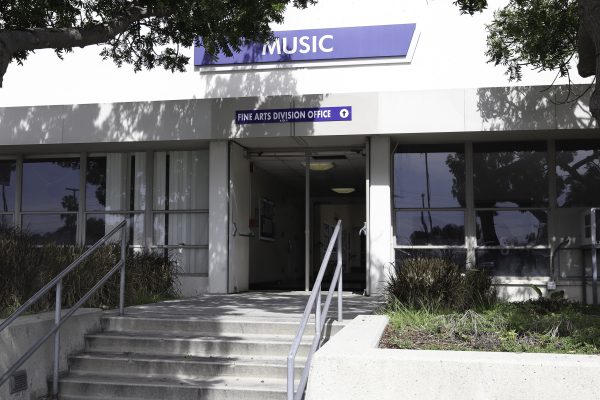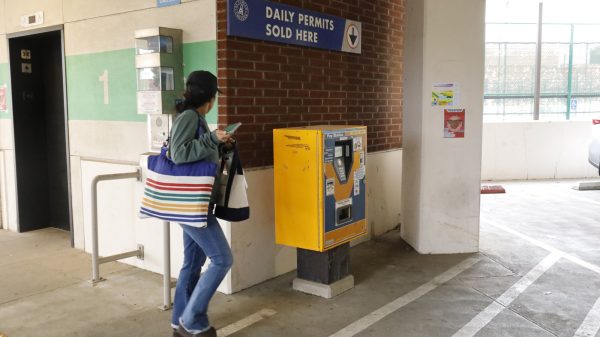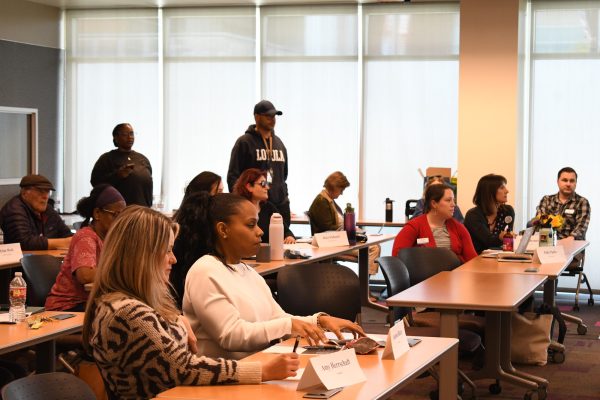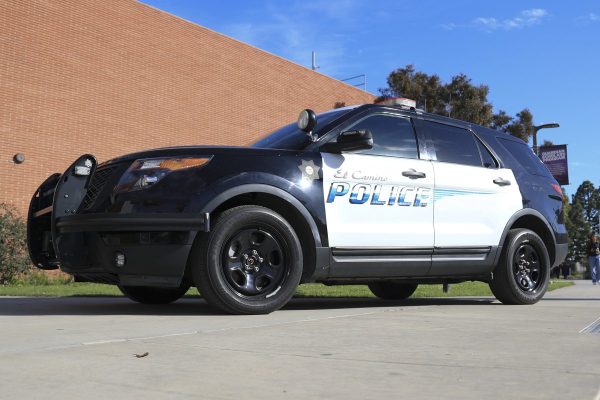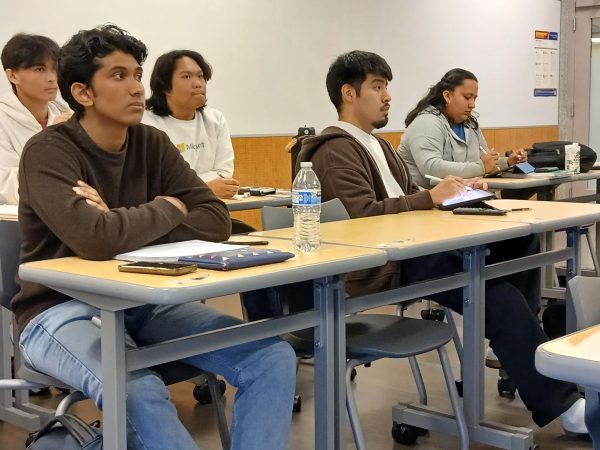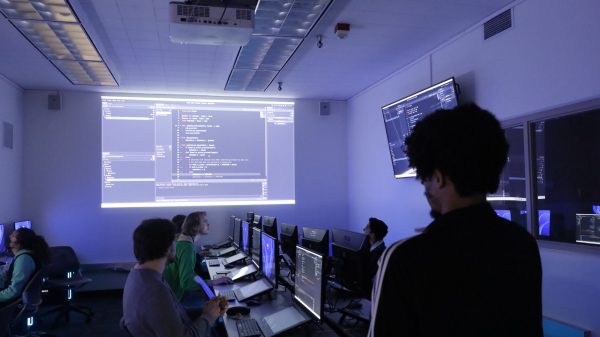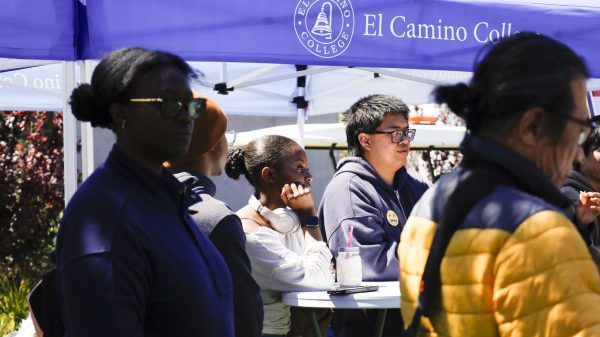Q&A with Board of Trustees candidates
In Nov., three vacancies will open up on the El Camino College Board of Trustees, with only one incumbent challenger.
Trustee Kenneth Brown and George A. Turner, Jr are running for the open seat in Area 1.
Trisha Murakawa and Siannah Collado Boutte are running in Area 3.
Lastly, David M. Kartsonis, Nicole A. Ryan and Katherine Steinbroner Maschler are running for the open seat in Area 4.
The Trustee candidates have answered a few questions about their campaign and what they will do if elected.
Q: What’s your background in higher education?
Area 1:
Kenneth A. Brown:
“So, I’m born and raised in Carson, and I went to a college in Atlanta, Georgia, at Morehouse College.
“Morehouse College is a historically black college and university (HBCU). And there, I was a physics major and computer science major, dual major. […] And so when I moved back to LA, I was at UCLA. And I actually was teaching at UCLA for a little bit, again, kind of doing the same thing, graduate’s studies. And then I got a job at Santa Monica College, and that was my first job at a community college.
“[I] had grown up on community colleges. [I] wasn’t too far away from Compton College, where my mother was a teacher, part time there. And my godfather was a professor at El Camino, in the psychology department. […] And then I ended up at Cal State Dominguez.
“And so that’s where I’ve been for the last 17 years, teaching part time. So I’m in the physics department right now teaching to the physical science teachers, as well as SMT, which is science, math, technology.”
George A. Turner, Jr.:
“So, I am a graduate of UCLA, undergrad and law school.
“During that time, prior to graduating from UCLA, I did attend both El Camino and Southwest during my summers.
“Most of my friends who I went to school with didn’t become lawyers, they became professors. So they’re all teaching now. And so they relay to me their experiences in higher ed and some of the issues they see that have come up.
“And that’s why I’m interested in this particular position, not just because of their issues, but because I see those issues sort of affecting the students in my community.”
Area 3:
Siannah Collado Boutte:
“I started El Camino. And I was there for three years before I transferred to USC. I majored in international relations and public policy minor. And then after that. Eventually, I went to southwestern in the fall of 2004, graduated in 2007, and I was a deputy district attorney for approximately nine years.
“And then four years ago, I started at a civil firm in Hermosa [Beach]. And during that time, I was teaching at Southwestern, a course called criminal law in action. So it was kind of like a practicum course for law students that were thinking about going into [criminal] law. I did that three years, like summer and winter
“not so much higher education to answer your question, but I also teach fifth graders for the last 10 years at different schools in LA County, I did five years at Centinela Valley and Inglewood.
“And then the last five years, I mean, obviously COVID kind of interrupted this school year. But it was at rosa parks in Lynwood. And it’s a really cool course, it’s for fifth graders, and it’s called Project Lead (legal enrichment and decision making). And it’s to help them learn about you know, bullying and peer pressure and work on their self-esteem and budgets, and expose them to other careers outside of whatever they may know from home.”
Trisha Murakawa:
“I went to college, I went to UCLA, because I went there I was part of higher education. But right after I graduated, I worked for two legislators.
“One of the legislators I worked for was Tom Hayden. He was in the state assembly, he chaired higher education. And he also chaired the Labor Committee. And so because of that, working on his staff, I was exposed to higher education issues and policies, higher education leaders.
“And then I worked at UCLA after that. And so I did state government relations, advocacy for higher education issues. I helped advocate and get passed, a bond that funded construction for higher education facilities, community colleges, Cal State, and University of California.
“And then the other thing that I do in that realm is a communications training every year probably for the last 10 years or so targeted toward Asian American and Pacific Islander students.
“They’re mostly community college students, but they’re students who have disabilities, whether it’s a physical disability or mental disability, many of them have some cultural issues. Many of them are immigrants, or refugees themselves. And so I do communication training for them every year, to try and help them learn how to more effectively advocate for themselves and for their community to sit the disability.”
Area 4:
Katherine Steinbroner Mauschler:
“I’ve been teaching for 35 years, five years [in] high school in East LA, 30 years at community college level; El Camino, LA Southwest, Compton, Santa Monica, Citrus College. I’m presently at Harbor college. Adjunct faculty for all that time.”
“I met my husband at El Camino back when we were going to school there. And he ended up working there also, So, as a wife, I ended up being involved in this even though I was a teacher.
“I am educated as I said, I went to school there, got my AA in business, transferred to Dominguez Hills for the bachelor’s degree in business and MBA and have also been in the business world shall we say? I did credit collections for many years.”
David Kartsonis:
“I am the only candidate who is running for this seat who went to El Camino College, taught as a TA at El Camino College, volunteered at El Camino College and served in a leadership position.
“About 20 years ago, I started attending El Camino at 13 years old. At the time, I was the youngest student to attend. I quite literally grew up at El Camino College. So it has a very special place in my heart.
“After graduating with my associates, I transferred and earned my bachelor’s, I returned to the South Bay, where I now co-own and run my family’s company in Torrance.
“I also live in Torrance with my wife and two children at home, I joined the El Camino College Foundation, and served in a volunteer capacity there as a board member for 11 years. In two of those years, I was president of the foundation.
“During my time as president, we awarded about 1300 scholarships, and $1.6 million in scholarships and campus support, we grew the South Bay promise, which I’m sure you’ve heard a lot about.
“When I was president, we did the Warrior Pantry, the veteran’s Warrior Pantry, which is a big, big thing for me. We always said it’s important to be able to take as much pressures off the students as possible to be able to let them focus on what they’re there to do [which] is to study and learn.”
Q: Why are you running for trustee?
Area 1:
Kenneth A. Brown:
“So I was appointed initially in December of 2010, which is a long time ago. And then I ran for election in 2011. And then we subsequently have changed our election cycle.
“Why I want to be a trustee is almost the same reason why I wanted to be a teacher. Being a teacher, you can affect the lives of maybe 30 to 45 people, and you can give them tools for life, you can give them tools for their career.
“If you’re teaching the teachers, that means you’re giving them tools that they can go out and use in their teaching environment.
“Being a board of trustees member, I can give the community tools, I can [affect] more students, I can affect more educators, I can affect the community more than I can [just] doing it by myself.
“Why I’m running for re-election is, we still have some work to do. Even before COVID, we were having some budgetary problems coming out of the state of California.
“[We’re] looking at diversity issues [and] racial injustice issues and how to fix those or not how to fix those, but how to even identify them. Now we’re even looking at food and housing insecurity.
“We got a number of students who are hungry, and who are not sure exactly where you know, they’re going to be living next month, let alone this week, and how they’re going to get their work done. And then you throw on COVID on top of that, you know, so we got a lot of, we’ve got a lot of issues that we’re gonna hit right away.
“And I don’t know about you, I want somebody who’s prepared and who’s equipped to understand the issues, as well as how to initiate those fixes. […] I have a lot of confidence in the team that we have right now. And this is just the wrong time to try to shake things up, in my opinion.”
George A. Turner, Jr.:
“First and foremost, the number of students who are coming out of my particular area. I’m born and raised in Inglewood, California.
“When I was growing up, El Camino was the place where students from Inglewood who graduated high school went. It met the needs of the students in Inglewood, whether they be professional needs, whether they [have] purely academic needs.
“And so when I discovered that the number of students coming from my district is kind of flatlining or going down, I said, well, that that’s a little concerning. My goal is to make sure that El Camino is meeting the needs of the people in my district.
“So that’s one goal, to increase the visibility. But then also, the goal is to really sort of assess and, and I guess, for lack of a better word, reimagine exactly what the institution is going to look like.
“For instance, the number of part time versus full time faculty and staff on campus, right, so I was surprised to discover that one-third of the people on campus who are faculty are full time and two-thirds are part time. And that that sort of troubled me for a variety of reasons. It’s time to start really reevaluating those sorts of things.”
Area 3:
Siannah Collado Boutte:
“When I was at El Camino, and way back in 2000, I was elected student trustee. Prior to that, I was the vice president of student community advancement. And I started off as a center of business.
“I just really enjoyed advocating for students. And on the board, I was the student Rep. I learned about policymaking and decision making and working with other parties. So that’s, that’s what piqued my interest in public policy.
“And then I followed it in college, obviously, and then in law school, I also was part of student government. And then I went to real government for nine years. [As] a lawyer, I do trials, and I’m speaking for victims of crime or people that have been wrongfully injured.”
“Opportunity arose. And with everything going on with the social justice movements, I kind of struggled with how I can contribute to my community. And what better way than giving back to the school that gave so much to me, and making sure that there are opportunities I was given 20 years ago are available or even better for students in the future.”
Trisha Murakawa:
“First, it’s an open seat, the incumbent is not running again. And so there’s an opportunity.
“But I’m running because I’m passionate about higher education. I worked on those issues when I was working in the state assembly. And then I continue to work with students.
“Both of my kids have benefited from participating at El Camino. They both did programs there. And I’m a stakeholder of El Camino.
“The other is that I’ve lived in Redondo Beach for 29 years, I’ve served on four different commissions over the span of 24 years, and running for Community College.
“And so I’m running because I think there’s a lot of opportunity to truly help El Camino take it to its next level of success.
“I think El Camino does a great job. And I think that it’s like a good time to help take it up a notch, and maybe another one. Who knows, I’m excited.”
Area 4:
Katherine Steinbroner Mauschler:
“I am running basically because I told my husband I would run. He wanted to run. Unfortunately, he could not because he was injured quite a few years ago at El Camino and was unable to do that. But it was his dream to run for the Board of Trustees. And that was something he was very, very happy about.
“Unfortunately, I lost him a year ago. And my promise to him was I would run for Board of Trustees. So together and separately, we were extremely involved without Camino College.
“We bought our house because it’s two blocks away from El Camino College. And our lives really revolved around El Camino and never really stopped even when he was no longer able to work physically.
“If not for them, frankly, I may never have met my husband. So hey, I’m grateful for that.
“And El Camino is extremely important to me individually. It was my education. It was the right place to be.
“I went to Catholic school for 12 years, I’d never been exposed to public school. I was lucky enough that my parents said hey, you’re going El Camino. And it was the best decision that my parents and I made. It was the best place for me to be. I got a really good education frankly.”
David Kartsonis:
“I was on the foundation for so long under the Bond Oversight Committee. […] So it’s just kind of a natural progression for me, having served so much on the foundation. I understand the college, I understand the students.
“One of the things I’ve said that I want to do, interesting, super minor goal, but I think it’s something that’s important, is that all the Board of Trustees need to read the scholarships. Because all of us on the foundation, we read the scholarship applications, and it really gives you a sense of who you’re serving.
“I mean, it’s just, it’s amazing. Some of the stories that people would tell us, some of the stuff that they would have to go through just to be able to go to school, it’s heartbreaking but it’s incredible.
“So I think it’s important for people to be able to see what you’re there for. So that’s, that’s why I’m running. El Camino has a special place in my heart. It’s important.
“I think the future is going to be difficult for a lot of reasons. We’re really figuring out how [we’re] going to be able to teach classes with people not being able to be in classrooms, for most of our classes.
“The budget is going to be a big issue coming out because the state budget is not great. And they keep saying that it’s not going to affect education. And I think that’s nonsense. We’ve already seen that it’s affecting education.”
Q: What goals do you have, should you be elected?
Area 1:
Kenneth A. Brown:
“COVID related issues and reopening up the school and figuring out what is safe. [Like] when it’s safe to reopen, what are the steps that we’re going to take?
“Another big issue, I think, is we got to look at the overall questions of racial inequality, and racial injustice.
“So, what does racial injustice and racial inequality look like for our campus? [Is] our campus diverse? Are we actively being anti-racist? Or are we allowing microaggressions or even macro aggressions to happen to our faculty, our staff, and even worse, our students?
“And what is the red tape that we have to cut through to get a diverse faculty and staff? Do we have a diverse faculty and staff? Is one department or one school more diverse than other departments? […]I think the third major bullet for or the third major issue, looking towards the future, is physical stability.
“Now, the last thing we want is [to] lay people off. That’s the last thing you want. But, if the budget from the state continues to do what it’s doing, based on COVID, we’re going [to] face some issues. I mean, we’re gonna have to, we’re gonna have to face it now. […] You want somebody in that seat who’s seen this before and who’s navigated it before.”
George A. Turner, Jr.:
“There’s a lot of things happening with regard to the budget, there’s a potential to literally change the sort of the folks who are employed on campus. [And] it’s a potential to lay off a significant amount of people.
“[…] So the first thing that I want to do is make sure that the folks who are employed on campus can maintain employment.
“Second thing that I want to do is I want to increase the visibility of El Camino, in my district. So if that means me showing up at City Hall, city council meetings, I’ll do that. That means showing up at churches on Sundays, I’ll do that.”
Area 3:
Siannah Collado Boutte:
“I want to meet with the students. I want to know how I could better assess their needs.
“I think one of the biggest needs at this time would be also hiring a new president because Maloney has indicated she’s not going to continue her presidency. And kind of go through the articulation agreements and figure out more like, what’s going on with the students and transferring rates, if that’s what they want to do, and how to assess the vocational programs, those are very important.
“I feel like there’s a lot of people going to trades. And you know, we definitely need people and plumbing, construction, electrician stuff, and mechanics.
“I know that there’s always a need for firefighters, I mean, California has been burning up. So, however, we could better assist, And I think the main item of business will be hiring a new president, and then making sure that we retain a recruit and retain the professors that will instill in the students a passion that I received when I was a student.”
Trisha Murakawa:
“the first thing that the board must do is hire the new president. I already have experienced something very similar. I was chair of the American Lung Association in California, the Lung Association for the whole state. And we had a CEO when I became chair of that board.
“So he was hired, he was a wonderful guy, he had good skills, but it just wasn’t a good fit for us for the Lung Association. And so I, as chair, was the one who had to basically release him or fire him.
“But the other privilege that I had as chair was to lead the effort to search and find the next CEO who replaced him and she was fabulous.
“She was a great leader, a great communicator, a great partner, with our staff, with our stakeholders, our donors, and it was a wonderful fit.
“And so I, I want to be part of that process, when we hire if I get elected the next president, because I’ll be looking for somebody who’s going to be committed, who has shared values, who is going to do the right thing for all of our stakeholders in El Camino, the students first and foremost, because our mission is to educate the students, educate you, and all of us play a role in that.
“[…] I really am looking for somebody who’s going to truly be committed and have a vision for El Camino, not just ‘oh, yeah, that’s a good stepping stone to my next job, you know?'”
Area 4:
Katherine Steinbroner Mauschler:
“The first goal we’re all going to have is to start putting together some type of plan for replacing our president. I think it’s probably very high on the list.
“Second on the list is dealing with COVID. We would also have to be looking at [what] the plan would be for fall.
“Number three, of course, is finances. Our enrollment is down as is every single community college in the state of California. So that has a big impact on finances.
“One of the questions asked last night was if you had to cut, where would you cut? And my big thing is you cannot cut classified, you don’t have classified you don’t have a college.
“So it’s more looking at the budget to see if anything can be cut, so that the students are not affected greatly. I’m sure though, that finances is going to be a huge thing.”
David Kartsonis:
“The budget is going to be big. It’s not really a goal, but the goal is staying solvent, the goal, the college needs to continue to exist. And that’s going to be a big goal.
“Honestly, I can’t say for sure that it’s going to happen. But based on what I’ve seen, there are some community colleges in our area that are going to suffer dramatically, and potentially get to a point where they’re not able to continue operating in the way that they’re operating.
“I mean, we saw what happens when what happened with Compton College. And luckily, El Camino was able to support them and get them back on their feet. And now they’re operating on their own again.
“The most important thing I want is to serve as a representative for what I see as the three stakeholders in our community, so you have the taxpayers who created the college to teach the community, you have the students who the college is built for, and then you have the faculty and staff which allows the place to run the way it runs.
“So I want to be a representative for all of them. I think, the more students that we can allow to focus on their studies, the better. So we have created that direct path from high school to college.
“Part [of the] South Bay promise wasn’t just the money, I mean, the money is great. Being able to not have to pay for your tuition is amazing. But all of the support systems that we built around that where you have, you have your special time with counselors, you have your cohort. It’s important for us to support them along the way.”
Q: Why should stakeholders vote for you as Trustee?
Area 1:
Kenneth A. Brown:
“If none of the public knows my name, I want them to look at the resume. I want them to look at the body of work. Just like if you’re hiring somebody for a job; who’s the most qualified? Who has the experience? Who has a plan, who has the vision and who has the tools?
“[Our] local and national politics has shown when you put people who are not experienced, or, who you know, want to shake up things, how well that works.
“Look at my body of work. Look at what I’ve done for students. Look at what I’ve done for El Camino. Look at what I’ve done for the 2.4 million community college students in California.
“I sit on a national committee for the Association of Community College Trustees. So here you have an existing trustee, who’s representing El Camino, who’s representing Inglewood, who’s representing the state of California, doing good work and has a track record of doing good work, versus somebody who wants to help.
“And we’ve got plenty of volunteer opportunities for folks to help. […] It’s all about the students and it’s not about you know, trying to please another body, [whatever] is my motivation is about educating students.”
George A. Turner, Jr.:
“I am a firm believer in the notion of service leadership. Okay, so I believe that if I put in should I be put in and I believe that I will be put in and elected, that I am going to be a representative and a server of the people of my district.
“I want to be somebody who literally is a representative of the people in the area. And that includes being held accountable for things that I promised that I didn’t accomplish, that includes meeting with those stakeholders regularly.
“That includes being an advocate when the doors are open and being an advocate when the doors are closed. I’m really just a passionate member of the community who wants to serve the needs of it.”
Area 3:
Siannah Collado Boutte:
“I believe that I present a well-rounded background. I was a student, I was always a warrior. I’ve taught so I can understand the teachers’ perspective. I’ve been an employee, so I understand the classified perspective. And now that I have my own firm, I’m an administrator.
“So I could see everyone’s point of view, and I’m also a taxpayer. So I want to make sure that I’m accountable to my base, and that there’s transparency in the process and the budget decisions for the college.”
Trisha Murakawa:
“I know that if I get elected, I want to be part of creating a good, solid culture that’s based on trust and respect, and putting the students’ interests first. And then after, when you do that, then what you have to make sure that everybody who’s involved in helping the students get what they need, [has] everything that they need. […] I’m committed to doing that, whether it’s resources, changes in policy or advocacy, finding funding, you know, whatever it is, opening doors, relationships, connections, whatever.
“I’m committed to doing that, because I think that El Camino has been doing a great job for what resources, technology, funding and relationships that it has. But I really feel like there’s so much more that we can do. And I want to do it. I’ve been around for a long time. So I know a lot of people have a lot of relationships. And I’m willing to leverage those relationships that will benefit El Camino.
“I don’t need to run for office, I’m middle-aged, I’m on the down part of that curve of my career. I’m going down, I don’t need to go up. So this is really about what I can do. Truly. It’s about the good that I can do. And I can’t do it by myself.
“I need partners, whether it’s partners at the Board of Trustees, partners, with the administration, partners, with the staff, partners, with the faculty, partners, with the students, partners with the outside community. That’s what I’m looking for.”
Area 4:
Katherine Mauschler:
“I don’t know about the other two, I cannot speak for them. But I have to say I think I have the passion for it at this point. Anything I don’t know how to do, I learn just like we all learn new jobs. I’m not saying I can do everything there on day one. But I will learn how to do it.
“If I have to research the heck out of something in order to figure out how to do something, I will do it. […] I am not looking to be there forever. I think it’s so important to be able to have new people in those positions as often as possible.
“If I were elected, I would not want to stay more than one or two terms, period. Because I really believe bringing new people in as often as you can brings new ideas, new blood, new ways of looking at issues and just makes the board even better.
“I am not a person who wants to stay there for the rest of my life. I believe that any type of position, political position needs new people every once in a while.
“It’s good to be in there to learn the job, do the job well. But then there’s a time when you have to hand over the reins to someone else to get those new ideas and new way of doing things and a new way of looking at issues that could work even better. You never know.”
David Kartsonis:
“From the list of candidates, I definitely have the most experience. I mean, Maschler has a lot of experience there as well, she has experience at El Camino College and she clearly has a passion for El Camino College and my other competitor has no personal connection with El Camino College, not saying that disqualifies her.
“So, what have you done to support the college before you start the campaign? What have you done to prove that you care enough about El Camino to become essentially the person that’s going to lead the institution?
“I’m one of the five people that run the college and I think I have shown that I’m passionate about El Camino College even when it doesn’t provide me with any power or title or anything.
“I love the school. So, years and years of my life have been donated to the school, so I’m passionate about it.”
Editor’s note: There is another candidate from Area three that will show up on the ballot only because he was technically unable to withdraw on time. He is no longer pursuing the position. Additionally, Nicole Ryan was unable to speak with The Union by our deadline.


